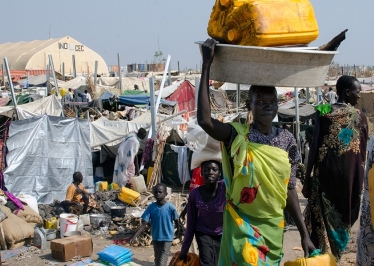S. Sudan Bishop urges US to tackle humanitarian crisis
October 22, 2019 (WASHINGTON) – As the civil war in South Sudan continues amidst the worsening humanitarian crisis, South Sudanese Bishop Eduardo Hiiboro Kussala is visiting the United States to bring attention to the situation in the young nation.

“The reason why I am here is to encourage the government of the United States to take its role of helping and assisting this young democracy to build a peaceful, prosperous country,” said Kussala
The Bishop, who heads the Tombura-Yambio Catholic diocese in South Sudan, said the US government has pulled back diplomatically even though it is still providing humanitarian aid to the African country.
“The U.S. needs to have a better relationship with the (South Sudan) government not just as a watchdog, but to work with them hand-in-hand to make sure that they do the right thing,” he said.
He says the U.S. government can use its influence to encourage South Sudan’s neighbouring countries to help bring stability to the independent country.
“We don’t regret becoming independent,” Kussala said.
“It is still the best gift for us, but the problem is it was too early for the international community to give up on us and let us go on our own. We should not be measured (with) other countries who are already developed. We are a young democracy and we need the support and the love of the world to continue to grow in the right direction,” he added.
Kussala has been trying to broker peace between the warring factions in South Sudan. He encouraged religious leaders to venture into the forest and encourage thousands of young rebels fighting against the government to lay down their weapons.
“I told them that we have to mobilize together to go and talk to the rebels and the government to stop war and bring peace, and we brought out over 10,000 young men who were in the bush,” Kussala recalled.
Due to the civil war, about four million people in South Sudan are living in refugee camps and more than five million continue to lack sufficient food, medication, and water and shelter.
“The impact of the war is huge,” Kussala said.
“In South Sudan, basic services are not there. The humanitarian support is very weak. The children and women are actually the major victims.”
South Sudan descended into war in December 2013 when President Salva Kiir accused the country’s former Vice President Riek Machar of plotting a coup.
In September 2018, the rival factions involved in the conflict signed a peace deal to end the conflict that has killed tens of thousands of people and displaced over 2 million people in the country.
In May, the two sides agreed to form a unity government in six months and in September said that they will establish a transitional government by November 12 as part of the deal.
(ST)
